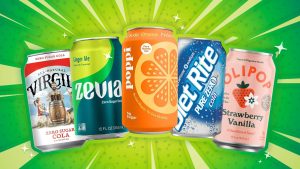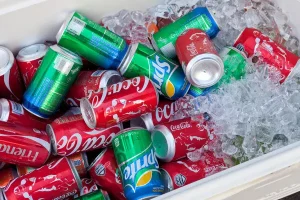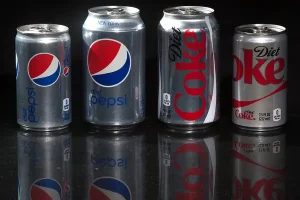
Costa Tropical Internet
Just another WordPress site
After years of loyalty to Diet Coke, we decided to explore aspartame-free alternatives for our daily fizzy indulgence. Aspartame, an artificial sweetener used extensively in diet sodas, has been linked to various health concerns, prompting us to find healthier substitutes. We embarked on a tasting journey of five aspartame-free alternatives, each with their unique flavors and ingredients.
First, we tried Zevia, a stevia-sweetened zero-calorie soda. It boasts no artificial sweeteners, making it an ideal choice for those avoiding aspartame. The taste was crisp, with a hint of bitterness, characteristic of stevia-based beverages. Next, we tried Virgil’s Zero, a drink sweetened with a blend of natural sweeteners like erythritol and monk fruit. Its rich, creamy root beer flavor won us over, but the slight aftertaste of erythritol might not appeal to everyone.
Our third contender was Bubly, a sparkling water brand with a variety of fruit-infused flavors. The subtle, refreshing taste was a delightful change from the strong sweetness of regular soda, making it a perfect choice for those looking for a milder fizzy drink. Fourth in line was Spindrift, another sparkling water, but with a twist. Spindrift is flavored with real fruit juice, resulting in a more robust flavor compared to Bubly. However, it also means more calories, so it may not suit those strictly counting their intake.

Finally, we tasted Hint Fizz, a carbonated version of Hint’s popular fruit-infused water. This one stood out for its simple ingredient list – carbonated water and natural fruit flavors. The flavor was more subtle than Spindrift but still satisfyingly refreshing.
Ultimately, choosing between these aspartame-free alternatives will depend on personal preferences. If you’re looking for a zero-calorie soda that mimics the sweetness of Diet Coke, Zevia or Virgil’s Zero could be your best bet. But if you want to break away from the traditional soda sweetness and venture into more natural, subtle flavors, then Bubly, Spindrift, or Hint Fizz might be more to your liking.
In conclusion, switching from Diet Coke to aspartame-free alternatives doesn’t mean you have to compromise on taste or variety. There’s a world of healthier fizzy beverages out there waiting to be discovered. It’s all about finding the right one that fits your taste buds and dietary needs.
Aspartame-free sodas are gaining popularity as people seek healthier alternatives to traditional carbonated drinks, offering a refreshing option minus the artificial sweetener. The high demand for these beverages has led to an array of choices on the market, making it easier than ever to enjoy a fizzy drink without the potential health concerns linked to aspartame. One notable choice is Zevia Zero Calorie Soda, which uses the natural sweetener Stevia, delivering a satisfying sweetness without any artificial additives. Another excellent option is Blue Sky Free soda which is sweetened with Truvia, a blend of natural sweeteners derived from the Stevia plant and Erythritol.
Virgil’s Zero Sugar sodas also deserve a mention, they are naturally sweetened with Stevia and available in a variety of flavors, each one offering a unique, delicious taste. Oogave is another brand that has received high praise for their organic and aspartame-free sodas, opting for agave nectar as a natural sweetener. Lastly, for those who prefer a fruitier option, Spindrift offers sparkling water with a splash of real fruit juice, providing a refreshing and guilt-free beverage. While these aspartame-free sodas vary in their sweetness levels, flavors, and ingredients, they all share a common goal: to provide a healthier, enjoyable alternative to traditional sodas. Whether you’re aiming to reduce your intake of artificial sweeteners, or simply looking for a new beverage to try, these aspartame-free sodas are definitely worth considering.
Taste test results often provide an enlightening perspective on the landscape of food and drink alternatives. From dairy-free milk alternatives like almond and oat to meatless options such as Beyond Meat or Impossible Foods, these substitutes are constantly being refined to mimic the taste and texture of their traditional counterparts. A standout in the dairy-free category is oat milk, acclaimed for its creamy texture and taste that closely resembles dairy milk, making it a popular choice for coffee drinks and cereals. In the realm of meat alternatives, Beyond Meat has been recognized for its impressive replication of the texture and flavor of beef, making it appealing even to carnivores. In the sweeteners category, stevia has made significant strides, with many taste test participants praising it for its natural, sugar-like taste without the calories.
The popularity of these alternatives is not just about dietary restrictions or health considerations, but also about delivering a comparable taste experience. While the flavor of these alternatives may not be identical to their conventional counterparts, taste test results indicate that they are increasingly being preferred for their unique, flavorful profiles. It’s not simply about finding a one-for-one replacement anymore, but discovering new tastes that add variety to our diets. So whether it’s sipping on a latte made with oat milk, enjoying a burger made from plant-based protein, or sweetening your tea with stevia, there’s a satisfying alternative out there that doesn’t compromise on taste. These taste test results serve as a testament to the progress made in the food and beverage industry, showcasing that alternatives can indeed stand out in their own right.

Aspartame, a low-calorie artificial sweetener, has been a staple in many diets for years, often used as a sugar substitute in a variety of food and drinks. However, numerous health considerations are prompting a growing number of people to make the switch to an aspartame-free lifestyle. First, there are potential adverse effects associated with the consumption of aspartame. Some studies suggest that it may lead to a range of health issues, from minor conditions like headaches and dizziness to more serious risks like cardiovascular disease and cancer. Although these findings are not entirely conclusive, they are enough to cause concern for some people. Second, aspartame can also impact the body’s metabolism and satiety cues.
As the body cannot process aspartame like regular sugars, it can disrupt the body’s ability to regulate hunger, potentially leading to overeating and weight gain. Lastly, some individuals may have a sensitivity to aspartame, which can result in an allergic reaction, presenting symptoms such as hives, itching, or difficulty breathing. For these reasons, many are choosing to eliminate aspartame from their diet. Instead, they are opting for natural sugar alternatives, like stevia or honey, or simply reducing their overall sugar intake. This shift towards aspartame-free options is not only a testament to the increasing awareness about what we put into our bodies, but also an effort to promote optimal health and wellbeing.
The debate over the cost-effectiveness of aspartame-free sodas is a topic that has been gaining considerable attention. Aspartame, a low-calorie artificial sweetener, has been linked to various health concerns, prompting many people to seek out alternatives. Aspart good. In response, several soda manufacturers have started producing aspartame-free versions of their popular beverages. However, these typically come with a higher price tag, leading consumers to question whether the benefits justify the additional cost. Scientific studies regarding the potential health risks of aspartame are inconclusive, and many health professionals maintain that moderate consumption is safe.
Nevertheless, there is a growing market for aspartame-free sodas, and many consumers are willing to pay a premium for these products. On the other hand, budget-conscious customers might find the price increase prohibitive, especially if they consume soda frequently. Therefore, the value of aspartame-free sodas largely depends on individual health priorities, dietary needs, and financial circumstances. In the end, the decision to invest in aspartame-free sodas is a personal one, and consumers should weigh the potential benefits against their budget constraints before making a choice. They might also consider other strategies to limit aspartame intake, such as reducing overall soda consumption or switching to other beverages.

Consumer’s preferences and choices are significantly influenced by product reviews, making them a crucial factor in determining top picks. These reviews offer valuable insights into the quality, functionality, and overall value of a product or service, providing potential buyers with a reliable source of information before making a purchase. In addition, they help to highlight top favorites among consumers, often leading to increased sales, popularity, and demand for those items. For instance, in the technology world, Apple’s iPhone consistently receives high ratings and positive reviews, making it a top pick among smartphone users. In the beauty industry, products from brands like Estee Lauder, Clinique, and L’Oreal often earn rave reviews for their effectiveness and quality, making them favorites among beauty enthusiasts.
Similarly, in the food and beverage sector, brands that receive consistently positive feedback, like Coca-Cola, Starbucks, and McDonald’s, remain crowd favorites. These brands have mastered the art of delivering quality products that meet or exceed consumers’ expectations, as evidenced by their positive reviews. These reviews are not merely limited to tangible goods. Services, such as those provided by Airbnb, Uber, and Netflix, also rely heavily on user reviews to maintain their status as top picks in their respective sectors. In conclusion, reviews play an instrumental role in shaping consumer favorites, and businesses should strive to meet and surpass customer expectations to garner positive feedback and become top picks.